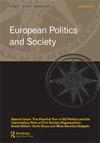俄罗斯在欧亚大陆的作用增强:三十年来的“近邻”*
Q1 Social Sciences
引用次数: 0
摘要
摘要在过去的十年里,俄罗斯对西方的政策变得更加敌对。正如普京总统所指责的那样,西方是否试图限制或遏制俄罗斯在其“近邻”的影响力?如果是,他们的努力是否成功?正是莫斯科决定走自己的道路,不融入西方,这使它与西方产生了分歧。除了对格鲁吉亚的军事干预外,到2008年秋天,俄罗斯还成功地阻止了大多数西方将几个后苏联国家与西方联系得更紧密的企图。六年后,乌克兰亲俄的亚努科维奇政府垮台,俄罗斯对克里米亚进行军事干预并将其并入俄罗斯联邦,俄罗斯在乌克兰东部分离主义地区建立保护国,并导致其目前入侵乌克兰。认识到莫斯科对俄罗斯的看法在与世界其他地区的关系中的作用是极其重要的,因为这种近乎救世主的看法是外交关系的核心。俄罗斯人目前的民族主义和大国自我形象是建立在几个世纪以来的这种观点之上的,并暗示着俄罗斯的主导作用,至少在其邻国是如此。本文章由计算机程序翻译,如有差异,请以英文原文为准。
Russia’s Enhanced role in Eurasia: the ‘near abroad’ three decades on*
ABSTRACT Russian policy has become much more hostile to the West in the last decade. Did the West, much as President Putin has charged, attempt to constrain or contain Russian influence in its ‘near abroad,' and, if so, were they successful in their efforts? It was Moscow’s decision to pursue its own path, by not integrating into the West, that put it at odds with the West. Besides its military intervention in Georgia, by fall 2008 Russia had successfully warded off most Western attempts to tie several post-Soviet states more closely to the West. With the collapse of the pro-Russian Yanukovych government in Ukraine six years later and the Russian military intervention in Crimea and its incorporation into the Russian Federation, and the establishment of Russian protectorates in the secessionist regions of eastern Ukraine and has led to its current invasion of Ukraine. It is extremely important to recognize the role of Moscow's view of Russia in relationship to the rest of the world since this almost messianic perception lies at the heart of foreign relations. Russians' current nationalism and self-image as a great power is built on centuries of such a view and implies Russia's dominant role, at least in its own neighborhood.
求助全文
通过发布文献求助,成功后即可免费获取论文全文。
去求助
来源期刊

European Politics and Society
Social Sciences-Political Science and International Relations
CiteScore
4.20
自引率
0.00%
发文量
35
期刊介绍:
The editors of European Politics and Society welcome the submission of high quality articles on all aspects of European Politics, widely defined to include, comparative politics, political sociology, social policy, international relations, security, and modern history. The geographical scope of the journal covers all parts of Europe including the Russian Federation. The Journal also welcomes proposals for special thematic issues. For further guidelines on submission of special issue proposals, please see the Instructions for Authors page. All articles will be subject to a rigorous double-blind peer review process by a minimum of two referees.
 求助内容:
求助内容: 应助结果提醒方式:
应助结果提醒方式:


